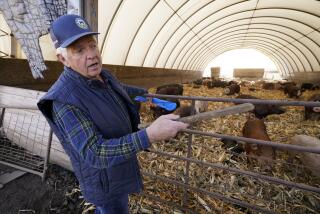Heartland Riven Over a Corporate Hog
- Share via
CHANCELLOR, S.D. — “Is that a wool sweater?” Craig Hoogestraat asks. “You might want to take it off. The smell gets in there and it won’t get out.” His dad, Don, interrupts: “Your hair. Do you have something to cover it? The smell can get to it real quick too.”
They’re right.
The smell is intense. It carries the tang of urine and the throat-clogging warmth of manure, but it is above all a meaty smell, earthy, dense and very strong.
It’s the smell of piglets--dozens and dozens of them, stepping on each other in squealing excitement as they nuzzle up to the huge, swollen teats of their huge, swollen mothers.
It’s the smell, too, of a way of life that the Hoogestraats fear is vanishing fast.
Instead of owning their own pigs, making their own decisions and risking their own money, the way the Hoogestraats do, farmers increasingly are giving up their independence to raise hogs for corporate producers like Cargill Pork or Tyson Foods.
This system is called contract farming. And it’s ripped apart rural communities across the Midwest.
In a bid to save the independent farmer, 59% of South Dakota voters last fall approved a constitutional amendment to ban corporate farming. Since then, the debate has only gotten nastier.
When Adam VanZanten, a college student who hopes to go into contract farming, raised objections to the amendment in a letter to the local newspaper recently, he received a furious--and anonymous--two-page response calling him a “sucker,” a “slave” and a “serf” for wanting to do a corporation’s bidding. His father, Greg, had a similar confrontation a few weeks back, when a neighbor lit into him for selling out to corporate masters.
“It has polarized the Midwest, no doubt about it,” Greg VanZanten said.
Family Farmer Is an Icon
It’s hard for outsiders to understand what a very big deal corporate farming is here.
Bacon is bacon. Pork chops are pork chops. Who cares if they come from a pig owned by a farmer or a pig owned by a corporation?
Out here in South Dakota, however--and in Iowa and Minnesota, Missouri and Nebraska, Illinois and Wisconsin too--the independent family farmer is an icon. A proud symbol of Midwestern grit. He feeds the nation with his smarts and his sweat. He toughs it out through good times and bad. And he wouldn’t ever take orders.
So it burns to see a farmer working as a virtual hired hand.
In contract farming, the company decides how the pigs will be reared, from what kind of barn they should sleep in to what kind of food they should eat.
The farmer can no longer raise the hogs from birth to butcher, either, the way independents have for generations. Instead, he must specialize: either he farrows the pigs, tending them for the first few weeks after birth, or he fattens them, stuffing them with corn until they hit 250 pounds. The company pays him a set fee--one that does not fluctuate with the market.
“Can you really call these people farmers?” asks Neil Hamilton, director of the Agricultural Law Center at Drake University in Des Moines. His answer is bitter: “You’ve pretty much sold your soul when you sign a contract.”
When corporations call the shots, adds Jim Potts of the National Family Farm Coalition, “you lose the art of farming.”
It happened in the South with the poultry industry, which is now almost entirely controlled by corporations and contracts. Midwesterners are not about to let it happen here.
“This is the lifestyle we have chosen,” said Craig Hoogestraat, 47, a bulky man with a watery blue eyes and a wind-chapped face. “We’re not going to give it up without a fight.”
But is it too late for such bravado?
Consider the numbers: A decade ago, small hog farms with fewer than 1,000 pigs accounted for one-third of the nation’s pork production. Today, they account for just 5%. Mega-farms with more than 50,000 pigs have filled the gap; their share of the industry has soared from 7% to 37% in the last decade.
The steady consolidation has forced out nearly 195,000 swine farmers in the last decade. In addition, experts say, an ever-increasing number of mid-sized hog farms are run under contract with corporations.
“At this point, there’s not a lot of hope for the independent family farmer,” said William Heffernan, a sociology professor at the University of Missouri who studies the industrialization of agriculture.
Corporate producers say they’re dominating the industry simply because they do a better job than independent farmers. Packinghouses prefer all their hogs to come in at the same weight and with the same percentage of body fat. Shoppers, meanwhile, want lean chops; they expect their pork to look like “the other white meat.” Corporate producers have the money and the technology to breed swine that meet those specifications.
“A lot of farmers want to keep the 1950s-style family farm going, but it’s almost impossible to do that and produce the consistent quality of meat consumers demand,” said Gina Bowman-Morrill of Farmland Industries, a huge pork-producing cooperative.
Giving Up the Family Farm
Greg VanZanten knows how tough it is to produce lean meat on an old-fashioned farm.
For a quarter century, he had been farming the traditional way: independent--and, he says, with hopelessly outdated methods. He let his hogs root around outdoors, where they grew thick layers of fat to keep from freezing. To produce the lean meat customers demanded, VanZanten knew he had to keep the pigs inside. But he didn’t want to take on $170,000 in debt to build barns just to bounce along with the ups and downs of the market.
So he went corporate.
Although a corporation owns the 5,000 pigs he fattens for market each year, VanZanten, 46, says he has not altered the rhythms of his small-town life. He still buys his tools at the local hardware store, still trudges to the barn at 3 a.m. when the heating system breaks down. The only difference now is he’s guaranteed a paycheck. For once, he feels secure.
Trying to keep the old-style independent farmer alive by constitutional amendment, VanZanten argues, is as absurd as trying to resurrect the old independent druggist by passing a law against Rite Aid and Sav-On.
“We’d all like to go back to the ‘50s and raise a few chickens and pigs. Life was simpler then,” his wife, Bev, said. “But this is the way the industry is going. If we want to be in it, we have to keep up.”
In this desolate patch of eastern South Dakota, where just a few straggly trees break the infinite monotony of flat sky and flatter fields, the VanZantens’ views don’t have much support.
Anti-corporate fervor has bubbled here--and around the Midwest--for years. But it crested this winter when hog prices crashed to disastrous lows not seen since the Great Depression.
Until the market began to rebound in January, farmers were losing $50 to $70 on every pig they sold. At one point, hogs fetched just 8 cents a pound, and farmers everywhere began giving them away rather than waste gasoline trucking them to market.
Even after Vice President Al Gore announced a $50-million cash bailout for pork producers, farmers continued to go bust.
And they didn’t go quietly.
In state after state, small-scale farmers charged that corporate pork producers had deliberately flooded the market to sink prices and drive independents into bankruptcy. Outrage crackled from the letters-to-the-editor page on newspapers across the Midwest. The corporations were “sociopathic,” one Iowa woman raged, and “cared nothing for the rural community.” A Minnesota man cursed them in print: “A plague on you and your hog houses!”
Corporate owners denied the charges. But the notion of a conspiracy resonated among a public already suspicious of big pig farms. Neighbors have long complained that the huge lagoons many corporations use to store hog manure reek horribly. Too often, environmentalists say, the lagoons leak or overflow, polluting rivers, killing fish and even percolating to underground reservoirs.
In response to these concerns, “in every state there’s some form of push to limit large-scale swine production,” said Mark Klein, a spokesman for Cargill Pork, the nation’s fourth-largest producer.
Some communities are using zoning laws to keep down the size of hog farms. Missouri is considering anti-odor regulations. Colorado voters enacted tough environmental rules in November. And the federal government is working on new standards for storing manure.
Still, at the Family Farm Coalition, Potts cannot muster much optimism. No matter how much public outrage soars, corporate hog producers continue to expand. And farmers continue to sign contracts.
“We’re winning so many individual little battles,” Potts said, “but we’re not winning the war.”
More to Read
Sign up for Essential California
The most important California stories and recommendations in your inbox every morning.
You may occasionally receive promotional content from the Los Angeles Times.













